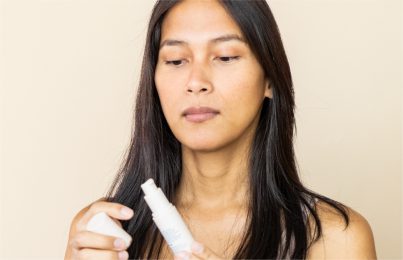Updated 12/08/21. Lately, I’ve noticed so many customers and clients have been asking about medical-grade and professional skincare products. They want to know what these terms really mean, whether my own skincare line falls into one of these categories and if this is something that could benefit their skin. I know there’s a lot of confusion surrounding this topic, so I thought I’d take some time to clear it up and offer insights from my 30+ years in the industry. (Plus, a dermatologist weighs in!)
- Medical-Grade Skincare
- Assumption #1: “Medical-grade products are stronger and more potent than ‘regular’ skincare products. They may be too harsh for my sensitive skin.”
- Assumption #2: “You can only get it with a prescription and should use it under dermatologist supervision.”
- Assumption #3: “Medical-grade skincare uses higher quality ingredients than other products. These ingredients have been tested.”
- Assumption #4: “Medical-grade products can only be bought at a medspa or doctor’s office.”
- Assumption #5: “Medical-grade skincare is more worth it than ‘regular’ skincare”
- Professional-Grade Skincare
- Assumption #1: “Professional products will be more effective and give better, faster, more noticeable results than ‘regular’ skincare products.”
- Assumption #2: “Professional products are more expensive.”
- Assumption #3: “The product and ingredients have been approved and endorsed by a qualified skincare professional”
- The Bottom Line
Medical-Grade Skincare
First, did you know that the term “medical-grade” is NOT regulated? This means that while it may have certain implications, it doesn’t carry any guarantees. To me, medical-grade is a term that’s used when a doctor or dermatologist is involved in the formulation of a product. Some brands that come to mind are Obagi, NeoStrata, Murad, and Dr. Dennis Gross.
Because it’s not a regulated term, people often have their own assumptions about what “medical-grade” skincare really means. I crowd-sourced for some of the most common assumptions about medical-grade skincare. Here’s what people think it means.
Assumption #1: “Medical-grade products are stronger and more potent than ‘regular’ skincare products. They may be too harsh for my sensitive skin.”
This is possible, but it’s not always the case. A product that’s marketed as medical-grade could be too harsh for your skin, but so could a product that’s NOT marketed as medical-grade. Some people think that medical-grade products contain higher percentages of certain ingredients than other products, but that’s not the case anymore. (It’s also worth noting that ingredient percentages aren’t everything.)
Take the Pro Results Serum, for example. It’s the strongest exfoliating acid serum in my skincare line and could easily be too strong for someone with sensitive skin. On the flip side, some medical-grade products are made specifically for soothing and comforting the skin. It all depends on the individual product as well as your unique skin and its needs.
Assumption #2: “You can only get it with a prescription and should use it under dermatologist supervision.”
This is false. Medical-grade formulas and prescription formulas are two very different things. Whereas medical-grade is an unregulated term (often used to market a product a certain way), prescriptions are heavily regulated. Prescription formulas are required to go through many rounds of rigorous testing and clinical trials before being approved by the FDA. Because prescription products are classified as medications, they should be used under the supervision of a doctor or dermatologist. Products could be labeled “medical-grade” without going through any special testing, and they certainly aren’t considered medications (although many brands who choose to market their products as “medical-grade” will often have clinical studies to back up the claims).
Assumption #3: “Medical-grade skincare uses higher quality ingredients than other products. These ingredients have been tested.”
I reached out to Dr. Kavita Mariwalla of Mariwalla Dermatology to get her thoughts on this topic as a medical skincare expert. According to Dr. Mariwalla, while medical-grade products were originally considered a step up from regular, over-the-counter products sold in grocery stores or beauty retailers, this isn’t necessarily the case anymore.
“As skincare has become more sophisticated, many brands have started to step up their ingredient game,” Dr. Mariwalla said. “Physician-dispensed products have also tried to go mainstream, thus blurring the lines between OTC drug or department store and medical-grade.”
At the end of the day, all of us formulators have access to most of the same ingredients when it comes to creating a skincare product. Very few ingredients are proprietary anymore. For example, PHAs (a class of exfoliating acids) used to be patented by NeoStrata until recently. Now that the patent has expired, you’ll see them popping up in more and more products.
As far as testing ingredients, there are 5 main ways companies do this:
- Clinical testing, which is a claim-substantiation test that allows you to make claims based on certain test results.
- 48-hour irritancy study, which determines if a product will cause irritation by breaching the skin’s barrier.
- In-house consumer testing, which bases a product’s claims off of the statements made by 20-30 consumer test subjects.
- Repeat insult patch test, which determines the likelihood of product causing skin rashes such as contact dermatitis.
- Ophthalmologist testing, which helps to ensure that a product made for the eye area won’t cause irritation should it make its way into the eyes.
It’s important to note that ANY skincare brand can choose to put their products through these tests. It’s possible that a medical-grade brand is more likely to put their products through clinical testing, but again, it’s not a guarantee.
Assumption #4: “Medical-grade products can only be bought at a medspa or doctor’s office.”
This is also not true! While this used to be the case back when medical-grade products first came on the scene, the internet has changed the way we purchase skincare. Now, you can buy products from brands that are considered medical-grade through online retailers or even at upscale department stores.
Assumption #5: “Medical-grade skincare is more worth it than ‘regular’ skincare”
At the end of the day, you simply can’t make this blanket statement. While there are a lot of really great brands out there that call themselves medical-grade, this is essentially a marketing term when it comes down to it. Every brand sets out to deliver results for the skin, and which ones you use will depend entirely on your personal skin goals and skin type.
Professional-Grade Skincare
Much like medical-grade, “professional” isn’t a term that’s regulated in the skincare industry. In my experience as an esthetician, professional products are sold exclusively to a licensed professional, be it a dermatologist or esthetician. These products are often sold in bulk and are meant to be used during treatments (think chemical peels). They’re also sold to licensed professionals to then sell to their clients or patients under their recommendation. Traditionally, this meant that these products weren’t sold in retail stores, but of course, these lines are starting to get blurred as the skincare market explodes.
Assumption #1: “Professional products will be more effective and give better, faster, more noticeable results than ‘regular’ skincare products.”
Similar to so-called “medical-grade” products, professional products could have stronger formulas, meaning formulas with higher percentages of ingredients like exfoliating acids and retinol. This could potentially drive a faster result, but it could also be more likely to cause skin barrier disruption and irritation. That’s why it’s wrong to make a blanket statement like this. It really just depends on the product and ingredients you’re talking about.
Assumption #2: “Professional products are more expensive.”
This can definitely be true since they’re theoretically harder to get than products sold in beauty retailers or on the internet, but I would caution against spending a crazy amount of money on a single product just because it’s marketed as professional. Again, skincare has come a long way, and almost everyone has access to the same quality ingredients for product formulation.
Assumption #3: “The product and ingredients have been approved and endorsed by a qualified skincare professional”
This isn’t necessarily true, as you can’t guarantee that anyone, in particular, is vouching for a product just because it’s marketed as professional. The best way to know who endorses it is to look at the source. If you get it from a practitioner who recommends it to you, I would consider that an endorsement, but this is more on an individual basis. Again, there are no special requirements for testing or reviewing products in order to label them as professional.
The Bottom Line
At the end of the day, you’re not getting any guarantees by purchasing products sold as “medical-grade” or “professional.” Ultimately, these are marketing terms. Brands that position themselves as such likely don’t have special access to exclusive ingredients or labs. Of course, this doesn’t mean there aren’t a lot of great products out there that call themselves medical-grade or professional. I just don’t believe these products are inherently better than any others.
I hope you enjoyed this post and got some valuable insight! There’s nothing I love more than using my formulation background and industry knowledge to help people become smarter, more informed skincare consumers. On that note, check out this at-home chemical peel, which really does give professional-strength results. I know this because I use it on my clients during skin treatments.
Next, read up on my thoughts on “clean beauty.”
Celebrity Esthetician & Skincare Expert
As an esthetician trained in cosmetic chemistry, Renée Rouleau has spent 30 years researching skin, educating her audience, and building an award-winning line of products. Her hands-on experience as an esthetician and trusted skin care expert has created a real-world solution — products that are formulated for nine different types of skin so your face will get exactly what it needs to look and feel its best. Trusted by celebrities, editors, bloggers, and skincare obsessives around the globe, her vast real-world knowledge and constant research are why Marie Claire calls her “the most passionate skin practitioner we know.”




Comments:
Really informative article. Thank you. I have tried high end beauty products and drug store brands and each have differing efficacy. Some high end brands did absolutely nothing for me while others were spot on great. The same goes for drug store brands. I think you have to try and find your own holy grail products that suit the skin your in at a particular time of life and environment. Many factors go into your decision.
Posted By: Mary Amighi |